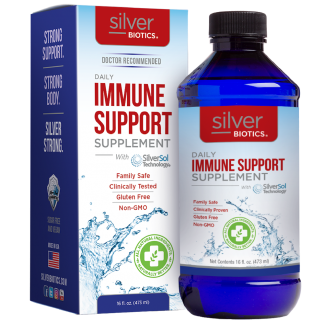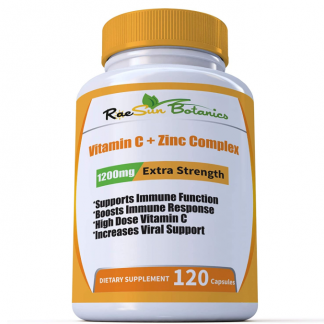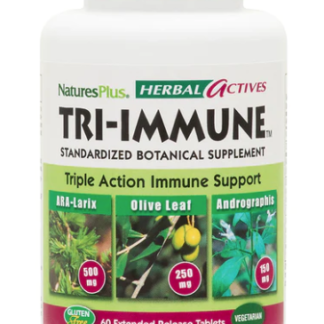Description
Herbal Actives Tri-Immune™ Extended Release Tablets
Icons for Herbal Actives Tri-Immune™ Extended Release Tablets
Do you want the best immune support supplement out there? Arm your immune system with Tri-Immune from NaturesPlus—three powerful defenders, one killer formula!*These statements have not been evaluated by the Food and Drug Administration. This product is not intended to diagnose, treat, cure or prevent any disease.
- Standardized olive leaf, ARA-Larix & andrographis
- Supports immune health*These statements have not been evaluated by the Food and Drug Administration. This product is not intended to diagnose, treat, cure or prevent any disease.
- Provides vitamin C & zinc for complementary effects
- Sustained release for greater absorption
- 30 Servings Per Container
If you’ve been more aware of the need for a strong immune defense lately, you’re not alone. But that raises the question: What is the immune system and what does it do?
What Does the Immune System Defend Against?
Your body consists of trillions of cells, all performing vital complex tasks every second of the day. But to give your cells the materials, such as oxygen and nutrients, they require to do this work, your body needs to interact with the world beyond its borders, a world filled with unwanted microbes and substances. It’s the immune system’s job to keep these intruders out.
What Are My First Lines of Defense?
Any part of your body that is in direct contact with the outside environment. That includes your skin, which serves as a mechanical barrier and produces a protective layer called the acid mantle; your lungs, which trap microbes in mucus to be expelled through the throat and nose; and your digestive system, which not only fends off invaders with its own secretions but also contains beneficial microbes called probioticsthat provide additional protection.
What Is the Innate Immune System?
Your skin, lungs and digestive system are all a part of the innate immune system. It also includes enzymes and proteins that help repel or remove invaders as well as killer cells that attack unwanted foreign microbes.
What Is the Adaptive Immune System?
The innate immune system provides general protection, but you also have a more focused line of defense called the adaptive immune system. As the name implies, this second system adapts to an ever-changing onslaught of unwanted microbes and substances, committing them to memory so that it can address them again in the future.
What Are White Blood Cells?
The body has two kinds of blood cells, the red ones that carry oxygen and the white blood cells (WBCs), which patrol the body and engage in cell-on-cell combat with unwanted microbes. The innate and adaptive immune systems each have their own WBCs; a third category of WBCs help the two systems communicate with each other:
Innate WBCs:These cells start working immediately because they are pre-programmed to identify and neutralize foreign cells and substances that routinely invade the body. This group includes basophils, eosinophils, mast cells, natural killer cells and neutrophils.
Antigen-Presenting WBCs: These cells bridge the innate and adaptive immune systems by capturing fragments of foreign cells and presenting them to cells in the adaptive WBC group. This group includes dendritic cells and macrophages.
Adaptive WBCs: These cells, which take several days to start working, provide a powerful, targeted response to each new infiltration of unwanted cells and substances. This group includes B cells and T cells, which are classified into subgroups: Helper B cells create immune substances called antibodies, killer T cells attack body cells that have been infiltrated with invaders and helper T cells assist both B and killer T cells.
What Is the Lymphatic System?
The lymphatic system consists of a clear fluid called lymphthat moves through its own set of lymphatic vessels. It has two functions, one of which is helping to return fluid to the circulatory system.
The lymphatic system also plays a vital role in immune function. It creates lymphocytes—the innate immune system’s natural killer cells, along with the adaptive system’s B and T cells—in red bone marrow; T cells develop further in the thymus, an organ in the chest. The lymphatic system then transports lymphocytes through its vessels; these are studded with lymph nodes, which contain many lymphocytes and filter lymph from nearby areas of the body.†The information provided is not an endorsement of any product, and is intended for educational purposes only. NaturesPlus does not provide medical advice and does not offer diagnosis of any conditions. Current research on this topic is not conclusive and further research may be needed in order to prove the benefits described. The conditions and symptoms described may be indicative of serious health problems, and therefore should be brought to the attention of a qualified healthcare practitioner.
Other parts of the lymphatic system include the spleen, an abdominal organ that filters blood and serves as a reservoir for both innate and adaptive immune cells, and patches of lymph tissue located throughout the body but are especially concentrated in the tonsils, respiratory tract and digestive system.
†The information provided is not an endorsement of any product, and is intended for educational purposes only. NaturesPlus does not provide medical advice and does not offer diagnosis of any conditions. Current research on this topic is not conclusive and further research may be needed in order to prove the benefits described. The conditions and symptoms described may be indicative of serious health problems, and therefore should be brought to the attention of a qualified healthcare practitioner.The information provided is not an endorsement of any product, and is intended for educational purposes only. NaturesPlus does not provide medical advice and does not offer diagnosis of any conditions. Current research on this topic is not conclusive and further research may be needed in order to prove the benefits described.
The conditions and symptoms described may be indicative of serious health problems, and therefore should be brought to the attention of a qualified healthcare practitioner.






